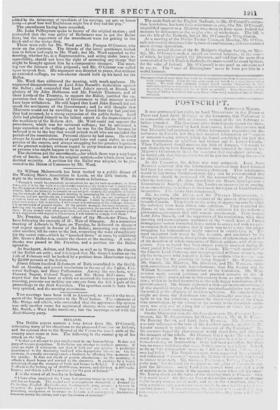IRELAND.
The Dublin papers contain a long letter front Mr. O'Connell, reiterating many of his objections to the proposed Poor-law 'or Ireland, and the opinion that to the Repeal of the Union the true It ends of the country must come at last. The following is the summit g up of his attack on the bill- " It does nut attempt to give employment to any human being. It does not purport to cure pauperism. It disclaims any attempt to eradicAn poverty. It gives no right of settlement, nor does it hold out any ponalty • r pecuniary punishment to the desolating landlord who depopulates his ',tees. On the contrary, it actually encourages such a landlord, by affording him .a excuse for his cruelty. It does nut check or punish absenteeism : the contrary, it affords a direct bonus and reward to the absentees. It ',noisily:, by a heavy' pecuniary charge the occupier of lands and houses in Ireland. T e only relict it affords is the locking up of 84),000 men, women, and children n 100 work- houses ; and this is called a provision fur the poor of Leland.'" It is the worst of all insults to Ireland— "1 have often imagined the Union had nothing worse in stir for us. Eat evil has no bounds. TA e ne;deet and contemptuous disregard Ireland tu leadinv English Radieds—the ;:i,,ttiiiwantile gang conspit, y to ruin by litigat. the popular 1lcprc.t'ntatives I - and now the Pourdaw, punishing occupation or residence in Leland, and encouraging i.bsentecistn, conies to crown the entire, and caps the climax a alwhid."
The main fault of the English Radicals, in Mr. O'Connell's estima- tion, heretofore, has been their reluctance to give, like Mr. O'Connell, unqualified support to a Ministry who mean to force upon Ireland the measure he denounces as the rte gus u!tra of wickedness. The bill is . not the bill of the Radicals, but of Mr. O'Connell's Whig friends.
At a meeting of the Dublin Trades Union, on Monday, Mr. O'Con- nell vehemently denounced the system of combination; and encountered much stormy opposition.
At the annual dinner cf the St. Bridget's Orphan Society, on Mon. day, Mr. O'Connell made a speech on several subjects ; in the cour7e of which, he highly lauded the Ministers, and said that the more they were assailed by the English Radicals, the more would he stand by them, for the sake of Ireland. Mr. O'Connell is too good an advocate not to say so. The " men of Birmingham " seem to have put him in a woful humour.


























 Previous page
Previous page